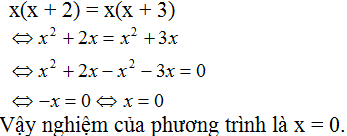
Hãy nhập câu hỏi của bạn vào đây, nếu là tài khoản VIP, bạn sẽ được ưu tiên trả lời.


Answer:
\(\left(x^2+x+2\right).\left(x^2+x+3\right)=6\)
Ta có: \(x^2+x+2=\left(x+\frac{1}{2}\right)^2+\frac{7}{4}>0\forall x\)
Ta đặt: \(a=x^2+x+2\left(a>0\right)\)
Lúc này phương trình trở thành:
\(a.\left(a+1\right)=6\)
\(\Rightarrow a^2+a=6\)
\(\Rightarrow a^2+a-6=0\)
\(\Rightarrow a^2+3a-2a-6=0\)
\(\Rightarrow a.\left(a+3\right)-2.\left(a+3\right)=0\)
\(\Rightarrow\left(a-2\right).\left(a+3\right)=0\)
\(\Rightarrow\orbr{\begin{cases}a-2=0\\a+3=0\end{cases}}\Rightarrow\orbr{\begin{cases}a=2\\a=-3\text{(Loại)}\end{cases}}\)
Với \(a=2\)
\(\Rightarrow x^2+x+2=2\)
\(\Rightarrow x^2+x+2-2=0\)
\(\Rightarrow x^2+x=0\)
\(\Rightarrow x.\left(x+1\right)=0\)
\(\Rightarrow\orbr{\begin{cases}x=0\\x+1=0\end{cases}}\Rightarrow\orbr{\begin{cases}x=0\\x=-1\end{cases}}\)

ghi rõ lại đề bạn mk không hiểu là 1/2 * (x+1) hay 1/2(x+1)

\(\left(x^2-x+1\right)+\left(x^2-2x+3\right)+...+\left(x^2-100x+199\right)=300\)
\(\Leftrightarrow100x^2-100x+\frac{\left[\left(199-1\right):2+1\right]\left(199+1\right)}{2}=300\)
\(\Leftrightarrow100x^2-100x+10000=300\)
\(\Leftrightarrow100x^2-100x+9700=0\)
\(\Leftrightarrow100\left(x^2-x+97\right)=0\)
\(\Leftrightarrow x^2-x+97=0\)
\(\Leftrightarrow x^2-2.x.\frac{1}{2}+\frac{1}{4}-\frac{1}{4}+97=0\)
\(\Leftrightarrow\left(x-\frac{1}{2}\right)^2+\frac{387}{4}=0\left(1\right)\)
Vì \(\left(x-\frac{1}{2}\right)^2\ge0;\forall x\)
\(\Rightarrow\left(x-\frac{1}{2}\right)^2+\frac{387}{4}\ge\frac{387}{4}>0;\forall x\)
\(\Rightarrow\)pt\(\left(1\right)\)vô nghiệm
Vậy pt trên vô nghiệm

pt: \(\left(1-2x\right)\left(x+3\right)\left(x^2+2\right)=0\)\(\Leftrightarrow\hept{\begin{cases}1-2x=0\\x+3=0\\x^2+2=0\end{cases}}\)\(\Leftrightarrow\hept{\begin{cases}x=\frac{1}{2}\\x=-3\\x^2=-2\left(loại\right)\end{cases}}\)
vậy: \(x=\frac{1}{2}\),\(x=-3\)

Lời giải của bạn Hòa như trên là sai. Vì bạn đã chia cả hai vế của phương trinh cho x mà chưa biết là x = 0 hay \(x\ne0\)
Nếu \(x\ne0\)thì lời giải như trên là chính xác.
Nếu x = 0 thì phương trình có một nghiệm là 0.
Nguyễn Việt Hoàng
Bạn Hòa giải sai. Vì không thể chia hai vế của phương trình đã cho với x (bởi vì x có thể = 0) để được phương trình x + 2 = x + 3. Làm như thế này có thể làm mất nghiệm của phương trình ban đầu.
- Lời giải đúng:
(Hoặc: x(x + 2) = x(x + 3)
⇔ x(x + 2) - x(x + 3) = 0 (chuyển vế)
⇔ x(x + 2 - x - 3) = 0 (rút nhân tử chung x)
⇔ x.(-1) = 0
⇔ x = 0)

\(\text{a) Thay a = 4 vào pt ta có:}\)
\(\frac{x+4}{x+2}+\frac{x-2}{x-4}=2\)
\(\Leftrightarrow\frac{\left(x-4\right)\left(x+4\right)+\left(x-2\right)\left(x+2\right)}{\left(x+2\right)\left(x-4\right)}=2\)
\(\Leftrightarrow\frac{x^2-16+x^2-4}{x^2-4x+2x-8}=2\)
\(\Leftrightarrow\frac{2x^2-20}{x^2-2x-8}=2\)
\(\Leftrightarrow2x^2-20=2.\left(x^2-2x-8\right)\)
\(\Leftrightarrow2x^2-20=2x^2-4x-16\)
\(\Leftrightarrow2x^2-2x^2+4x=-16+20\)
\(\Leftrightarrow4x=4\)
\(\Leftrightarrow x=1\)
\(\text{b) Thay x = -1 vào pt ta có:}\)
\(\frac{-1+a}{-1+2}+\frac{-1-2}{-1-a}=2\)
\(\Leftrightarrow\frac{a-1}{1}+\frac{-3}{-\left(a+1\right)}=2\)
\(\Leftrightarrow\left(a-1\right)+\frac{3}{a+1}=2\)
\(\Leftrightarrow\frac{\left(a-1\right)\left(a+1\right)+3}{a+1}=2\)
\(\Leftrightarrow\frac{a^2-1+3}{a+1}=2\)
\(\Leftrightarrow a^2+2=2.\left(a+1\right)\)
\(\Leftrightarrow a^2+2=2a+2\)
\(\Leftrightarrow a^2-2a=2-2\)
\(\Leftrightarrow a\left(a-2\right)=0\)
\(\Leftrightarrow\orbr{\begin{cases}a=0\\a-2=0\end{cases}\Leftrightarrow\orbr{\begin{cases}a=0\\a=2\end{cases}}}\)
Vậy để pt có nghiệm là x = 1 thì a = {0 ; 2}
\(a.Thay:a=4\Leftrightarrow\frac{x+4}{x+2}+\frac{x-2}{x-4}=2\)
\(\Leftrightarrow\frac{\left(x+4\right)\left(x-4\right)}{\left(x+2\right)\left(x-4\right)}+\frac{\left(x-2\right)\left(x+2\right)}{\left(x-4\right)\left(x+2\right)}=\frac{2\left(x+2\right)\left(x-4\right)}{\left(x+2\right)\left(x-4\right)}\)
\(\Rightarrow\left(x+4\right)\left(x-4\right)+\left(x-2\right)\left(x+2\right)=2\left(x+2\right)\left(x-4\right)\)
\(\Leftrightarrow x^2-4x+4x-16+x^2+2x-2x-4=\left(2x+4\right)\left(x-4\right)\)
\(\Leftrightarrow2x^2-20=2x^2-8x+4x-16\)
\(\Leftrightarrow2x^2-20-2x^2+8x-4x+16=0\)
\(\Leftrightarrow4x-4=0\)
\(\Leftrightarrow x=1\)

Ta cm BĐT :
\(\left(a+b+c\right)^2\le3\left(a^2+b^2+c^2\right)\)
<=> \(3a^2+3b^2+3c^2-a^2-b^2-c^2-2ab-2bc-2ac\ge0\)
<=> \(2a^2-2ab+2b^2-2bc+2c^2-2ac\ge0\)
\(\Leftrightarrow a^2-2ab+b^2+b^2-2bc+c^2+c^2-2ca+a^2\ge0\)
<=> \(\left(a-b\right)^2+\left(b-c\right)^2+\left(c-a\right)^2\ge0\) (luôn đúng với mọi a ; b; c )
Dấu '' = '' BĐT xảy ra khi a =b =c
(*) ÁP dụng BĐT với \(a=x^2;b=x;c=1\) ta có
( VẾ trái ) = \(\left(x^2+x+1\right)^2\le3\left[\left(x^2\right)^2+x^2+1\right]=3\left(x^4+X^2+1\right)=\left(vế\right)phải\)
Dấu ' = '' xảy ra khi \(x^2=x=1\Leftrightarrow x=1\)
Vậy pt có n* duy nhất là 1


\(\dfrac{x-3}{x-2}+\dfrac{x+2}{x}=2\)
Điều kiện: \(x\ne2;x\ne0\)
\(\Leftrightarrow\dfrac{x\left(x-3\right)}{x\left(x-2\right)}+\dfrac{\left(x-2\right)\left(x+2\right)}{x\left(x-2\right)}=\dfrac{2x\left(x-2\right)}{x\left(x-2\right)}\)
\(\Rightarrow x\left(x-3\right)+\left(x-2\right)\left(x+2\right)=2x\left(x-2\right)\)
\(\Leftrightarrow x^2-3x+x^2-4=2x^2-4x\)
\(\Leftrightarrow2x^2+3x-4=2x^2-4x\)
\(\Leftrightarrow x=4\)